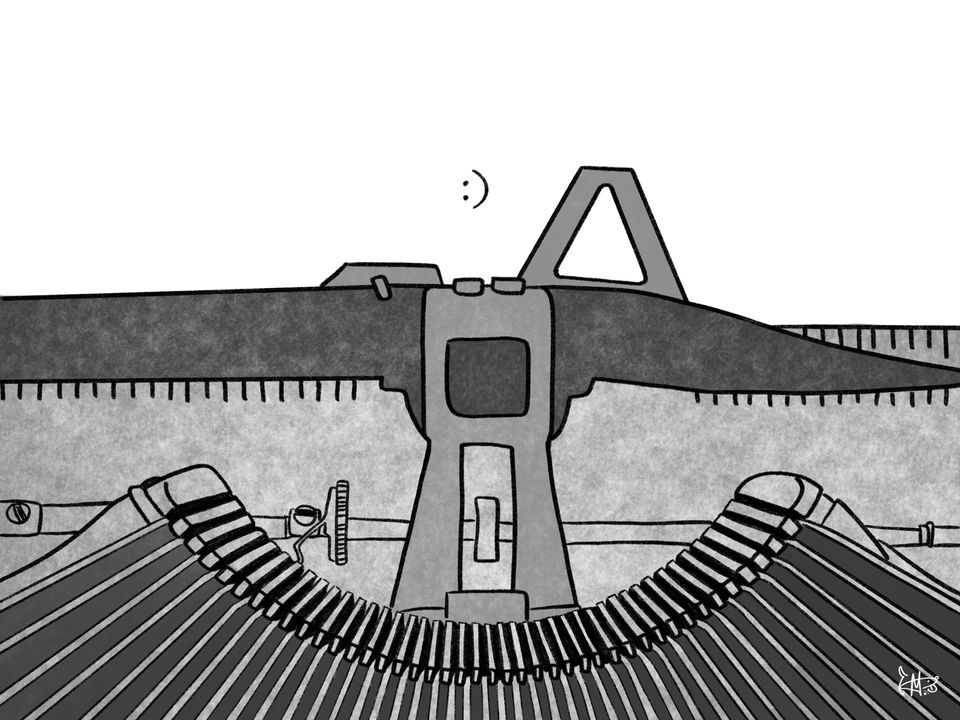Manual Competence & Analogue Joys

Art: Jessica Keiko Mitsumasu ©
Most digital media, from Spotify to Facebook to smartphone notifications, offer a functional everything to each customer. Here’s the only device/app/service you’ll ever need! The pitch aggravates FOMO (the fear of missing out) by offering to fix it. Facebook makes sure no one misses those baby photos, and Netflix promises to recommend the next series you need to watch. This is the exact opposite of the constrained experience offered by analogue tools.
Last year, I bought an old Sony Walkman from the year I was born, 1989. Yes, one of those big yellow bricks that plays audio cassettes. And it’s not a dusty collector’s item. I use it regularly for the runtime of the average Bruce Springsteen album. When I brought home this prize, it was in rough shape; it didn’t just work. So, after securing a discount, I got to work at my kitchen table.
I’m not what people call “handy,” but the object before me was comprehensible. I could see its (missing) hinges and mechanisms. This Walkman was the antithesis of the modern “smart” device, which is presented as a frictionless portal. In place of a scrying stone whose technological wizardry is indistinguishable from magic, I held mere matter in my hands, and I worked my will upon it. I cut a length of paper-clip with pliers, bending it back on itself, and inserted my makeshift hinge. After some shimmying, the door that secures the tape deck clicked into place. A small act, maybe, but one that renews my agency. Contrast this bit of mechanical resistance with an increasingly inscrutable world of black-box devices and services, where users are permitted to choosers and consumers, but little else.
Ivan Illich, writing in Tools for Conviviality, helped me to make sense of why fixing my Walkman feels different from fiddling with settings on my iPhone and why human-scale experiences just feel different. First, the structure of the tools in question matter a great deal. For Illich, “the less [tools] are convivial, the more they foster teaching.” This means the less personal and creative agency enabled by a tool, the closer we move to “a monopoly of understanding.”
In limited and well-integrated tribes, knowledge is shared quite equally among most members. All people know most of what everybody knows. On a higher level of civilization, new tools are introduced; more people know more things, but not all know how to execute them equally well. Mastery of skill does not yet imply a monopoly of understanding. One can understand fully what a goldsmith does without being one oneself. Men do not have to be cooks to know how to prepare food.
Crucial to my experience was the ability to comprehend the object in front of me. The Walkman’s operation was largely comprehensible to me. I could see the consequences of the missing hinge and imagine a solution, just as I could see gunk on the tape-head I could clean away, improving the sound of my music. My interactions with the Spotify app are not comparable. When a ‘connecting…’ alert hangs, or even when I change the stream’s quality, all I can do is shrug my shoulders. I have little to no say in its operation apart from my discrete choices, which is appropriate since I simply pay for access to content.
It’s a strange experience in 2020 to value the constrained experience of an old Walkman more than the everything-right-now value proposition of Spotify. Does food you have a hand in preparing taste better? Sometimes, yes. And while Illich’s critique in the passage above is directed towards industrial-scale education, it holds wisdom for how we interact with the world.
Illich goes on to sketch a roughly inverse relationship between increasing complexity and decreasing human agency. He offers the example of the city child, who is connected to “thousands of systems, but only peripherally with each.” She knows how to operate the Smart TV and ask Alexa questions, “but their inner workings are hidden.” In this now familiar environment, “learning by primary experience is restricted to self-adjustment in the midst of packaged commodities” and we become less secure in straying from user-friendly but corporately sanctioned manuals. This, asserts Illich, affects the “balance of learning,” skewing it towards formal education and away from the competence-building effects of experience. In this world, “people know what they have been taught, but learn little from their own doing,” thereby creating in them a need for education.
I don’t know how many certifications I need to safely service an iPhone without voiding the warranty, but it’s probably more than one, and that’s one more than my old Walkman requires. Of course, I could crack open that glass box, but, unlike the relatively simple mechanisms of my Walkman, I wouldn’t be fixing problems with pliers and paper-clips.
Still, the experience of tinkering gave me a taste for more. Instead of a desire for self-sufficiency, it was a hunger for the rewards of what Cal Newport calls manual competence. Newport, quoting Matt Crawford, reminds us that the digital abstractions of knowledge work often result in ends at odds with more manual work. “The satisfactions of manifesting oneself concretely in the world through manual competence,” Crawford writes in Shop Class as Soulcraft, “have been known to make a man quiet and easy.” The sending and receiving of digital ephemera exhausts us.
This isn’t to say that manual work is easy. Competence of any kind takes time, and I’m not the person to call to fix an old Walkman, but there are lessons here for people conjoined to consumer electronics. For one, the kind of focus engendered by tinkering with analogue tools is often called upon in their use. Buttons, and other physical features, are unique in a way that screens are not, so while changing the cassette in a Walkman is easy, it’s not as easy as tapping a new playlist in Spotify. The result is more sustained engagement because of the friction inherent to the physicality of analogue tools. Inconvenient, maybe, but far more interesting too.
It doesn't hurt that contemplating the work of my own hands on the Walkman–and feeling its subtle hum–reminds me that limits are good. And, sometimes, in seeking less than everything, we get a little more out of the experience.



Member discussion